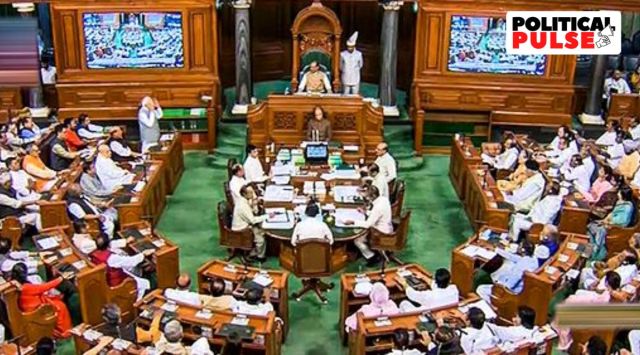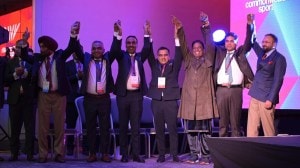Women’s Reservation Bill, version 2010: Two proposed constitutional amendments mirrored SC-ST quota in Parliament, Assemblies
The Bill also included an addition to Article 239AA, which grants Delhi its special status as the national capital. It sought to substitute the term “Scheduled Castes” with the “Scheduled Castes and women”.
 The second addition to the Constitution proposed by the 2010 Bill was Article 332A for dealing with SC-ST seats in the state Assemblies. (PTI Photo)
The second addition to the Constitution proposed by the 2010 Bill was Article 332A for dealing with SC-ST seats in the state Assemblies. (PTI Photo)The 108th Constitution Amendment Bill to reserve one-third of all seats for women in the Lok Sabha and the state Legislative Assemblies was introduced in the Rajya Sabha in May 2010 during the tenure of the United Progressive Alliance (UPA) government. Though the Rajya Sabha passed the Bill, it lapsed after the Lok Sabha did not vote on it.
The Bill sought to bring about the crucial change by inserting new provisions that would mirror the Articles that provide for representation in Parliament and state Assemblies for Scheduled Castes (SC) and Scheduled Tribes (ST).
Here’s a breakdown of the 2010 Bill.
Lok Sabha
In the Lok Sabha, the Bill provided that reserved seats for women may be allotted by rotation to different constituencies in states or Union Territories.
For this provision, the Bill sought to introduce a new Article in the Constitution — Article 330A. This provision would have mirrored Article 330 of the Constitution, which provides for reservation of seats for SCs and STs in the Lower House.
Section 1 of the proposed Article 330A would have stated that seats shall be reserved for women in the Lok Sabha. If a state or Union Territory has only one seat, it will be reserved for women on a rotational basis — in this case, in every third election, with the seat being unreserved in the two intervening elections, according to the proposed article. In the seats reserved for SCs and STs, the Bill sought to assign a third of these seats to women on a rotational basis. So, in effect, no seat would have been reserved for SC or ST women in consecutive elections.
Of the two seats in the Lok Sabha reserved for Anglo-Indians, the Bill proposed that one of the seats would be reserved for women in two of every three consecutive elections. Article 331 deals with the Representation of the Anglo-Indian community in the House of the People.
State Assemblies
The second addition to the Constitution proposed by the 2010 Bill was Article 332A for dealing with SC-ST seats in the state Assemblies.
The Bill sought to reserve one-third of all seats in the Assemblies for women. In the seats reserved for SCs and STs, the Bill sought to assign a third of these seats to women on a rotational basis, similar to the Lok Sabha provision.
The 2010 Bill also included an addition to Article 239AA of the Constitution, which grants Delhi its special status as the national capital.
Article 239AA (2)(b) reads: “The total number of seats in the Legislative Assembly, the number of seats reserved for Scheduled Castes, the division of the National Capital Territory into territorial constituencies (including the basis for such division) and all other matters relating to the functioning of the Legislative Assembly shall be regulated by law made by Parliament.”
The term “Scheduled Castes” was sought to be substituted with the “Scheduled Castes and women”.
The Bill also proposed an amendment to Article 334 of the Constitution to introduce a sunset clause on reservation for women, which would expire 15 years from the date of the law coming into effect. Article 334 deals with a similar sunset clause for other reservation of seats and special representation, which will cease to exist after 70 years.





- 01
- 02
- 03
- 04
- 05


























